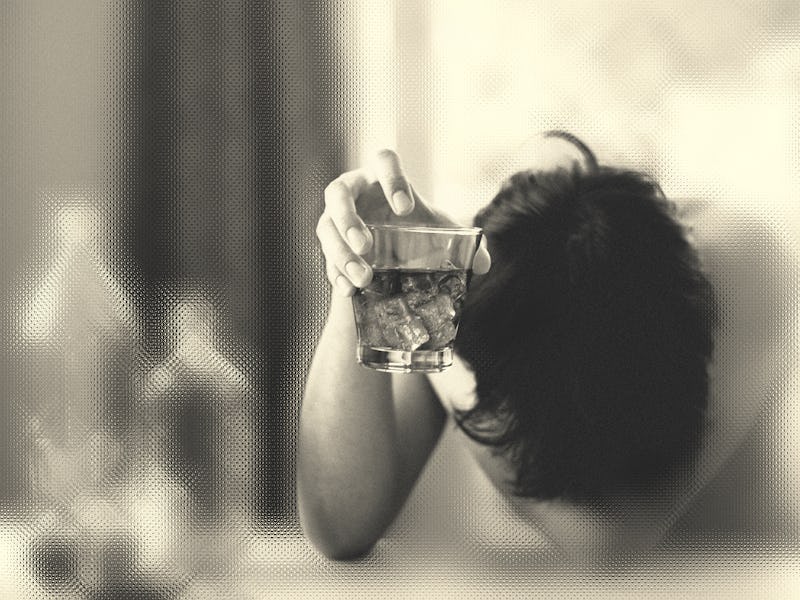New Study Hints at Why Some People And Not Others Feel More Anxious After Drinking
Here’s why you should care about this “harm paradox effect.”

Have you ever come home after a hard day at work and cracked open a bottle of wine to “take the edge off?” One glass deep, you might start to unwind, sure, but you might also be tempted to have another glass. And another. And then do it again the next day when you come home just as sad and anxious and need to do something — anything — to calm down. But before you do, here’s the hard truth: People with diagnosed anxiety and depression are more likely than others to become addicted to alcohol. But the reason why this is true is a huge question scientists are eager to answer.
One argument seems particularly salient: People with anxiety and depression use alcohol to “self-medicate,” and what started as a quick fix for relaxation eventually escalates to developing alcohol use disorder. This is a disease that causes a strong need to drink, a loss of control, and heightened feelings of anxiety and irritability when sober.
But while some people do use alcohol for its anxiety-quelling effects, “this is clearly not the whole story,” says Matt Kushner. He is a professor at the University of Minnesota who’s studied the link between anxiety and alcohol problems for 30 years.
We know this, Kushner says, because issues with alcohol can start before people develop anxiety or depression. His research also suggests that having either a dependence on alcohol or an anxiety condition substantially increases the probability of developing the other condition within several years.
For Kushner, this two-way relationship suggests alcohol use disorder and anxiety and depression might share a root cause.
Kushner’s team’s latest research brings us one step closer to figuring out why these conditions are so closely linked: Their study suggests people with a diagnosis of anxiety or depression are more likely to experience alcohol use disorder symptoms than people without these conditions, even when they drink the same amount of alcohol. The results are published in the journal Alcohol: Clinical & Experimental Research.
This phenomenon — where one group experiences more harm than another even though they do the same thing — is called the “harm paradox effect.”
Understanding how anxiety, depression, and alcohol use disorder connect yields a practical, and much-needed, strategy for treating these conditions: Historically, most researchers believed distinct diagnoses should be treated by specific interventions, not in combination with other diagnoses. But it could be better to modify or combine interventions when treating people with multiple, related conditions.
Alcohol, anxiety, and the brain
Alcohol use disorder is a disease that causes a strong need to drink, a loss of control, and heightened feelings of anxiety and irritability when sober
We know that people with an alcohol use disorder also tend to have conditions characterized by anxiety and depression. Approximately 20 to 40 percent of people with one of these conditions also have alcohol use disorder, compared to 5 percent of the general population.
Yet despite the prevalence of both diseases appearing hand in hand, the efforts to understand why this connection exists have yielded mixed results. While it’s true that some people — hoping to find mental health relief — turn to alcohol, this explanation can’t fully clarify the link.
“Although there may be multiple factors that contribute to the association between anxiety, depression, and alcohol problems, our work adds another piece to the puzzle by showing that individuals with anxiety or depression seem primed to develop alcohol problems,” Kushner says.
This layer of the mystery stems from a new analysis of 26,000 adults. In this study, the research team compared alcohol use disorder-related symptoms in individuals with an internalizing condition (eg. anxiety and depression) and those without.
The study also suggests the harm paradox is equally evident in men and women, and is more pronounced in individuals with more than one anxiety or depression diagnosis, regardless of whether their condition was current or something they had experienced in the past.
This finding — that the harm paradox effect was also found for people who experienced anxiety or depression in the past — would be “unexpected if ‘self-medication’ was the exclusive explanation for the association,” says Kushner, “because [that theory] relies on active anxiety/depression symptoms as the driver of excessive alcohol use.”
More research is needed to explain the link, but Kushner and his colleagues suspect it may have to do with the brain. The neuro-dysregulations underlying alcohol use disorder and internalizing conditions overlap in important ways, and the study team argues that it is “reasonable to consider how the common co-occurrence of the conditions may be an outgrowth of shared neurobiology.” Often, the parts of the brain affected are those to do with stress and reward.
There are a few ways a brain can become dysregulated. The study teams say there’s some evidence that suggests some people are born with brains that make them more vulnerable to developing these conditions. Meanwhile, there’s also evidence that clinical anxiety or depression can cause an enduring neurobiological change that makes individuals more likely to develop alcohol use disorder symptoms. This vulnerability can persist even after the anxiety and depression have abated, Kushner explains.
“Individuals with anxiety or depression disorders should be aware that they may be more sensitive to the ill effects of alcohol use than others,” he says.